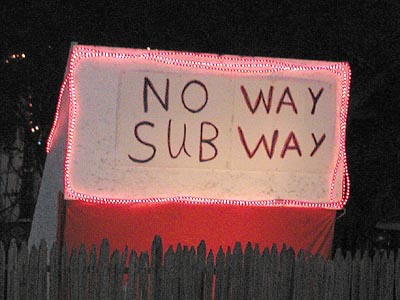
San Juan Bautista residents crammed into City Hall Monday night
for a public hearing on extending the city’s moratorium on retail
businesses and chain stores.
San Juan Bautista residents crammed into City Hall Monday night for a public hearing on extending the city’s moratorium on retail businesses and chain stores.
After a lengthy hearing, the Council voted 4-1, getting the needed four-fifths majority to adopt the urgency ordinance against “big-box” retail businesses that could last up to two years.
The controversial moratorium, whose focus has fallen on plans to put a Subway sandwich store in Windmill Plaza, is intended to give the city time to undertake a planning process that will determine how it will regulate franchises and large-scale businesses.
“This is not a permanent ban on the type of businesses coming into the city,” City Attorney Patrick Whitnell said. “At maximum, this is going to be a two-year moratorium.”
The moratorium is based on the public’s health, safety and welfare, which Whitnell said is regulated by the city’s authority under its police powers, which the courts will uphold as long as they are not in conflict with general law.
“The city’s regulation must be reasonable, non-discriminatory and not arbitrary or capricious,” Whitnell said.
Whitnell said the city is studying a possible adoption of amendments to its general plan, zoning ordinances and development standards to assure that new retail and commercial development in the city is consistent with its historic character.
“The moratorium had nothing to do directly with Subway,” he said. “It has to do with the Alameda Plaza. There was concern there were no regulations in place that would prevent a formula or a large-scale retailer to locate within the city.”
Attorney Peter Spurzem, representing Windmill Plaza owners Jim Gibson and Dan Mello and Subway applicants, Matthew and Yvette Papenhausen, said under public health, safety and welfare the ordinance must have a reasonable basis of fact.
“In this case, I believe it does not appear to be any immediate threat, but a sole applicant,” Spurzem said.
He said when the basic concerns are stripped away, all that’s left is an ordinance that discriminates against a particular type of business.
“The ordinance language is drafted only to capture a franchise,” Spurzem said. “In my opinion, that’s a form of economic discrimination.”
Gibson said the urgency ordinance was really about Subway because there were no issues other than the store’s sign.
Yvette Papenhausen said the Subway store would create jobs for about 13 San Juan teens who would not have to travel to Gilroy or Hollister for employment. She also said it would be good for local tourism.
“People feel comfortable with something they are familiar with, especially children,” she said.
Many residents spoke at the meeting against the moratorium while an equal number of residents supported its adoption.
Former San Juan resident James Dulin said he conducted a survey of 100 people, of which 92 said
they supported local businesses. “Only eight said they would support Subway,” he said.
Resident Cara Vonk said allowing franchise businesses into the city would keep tourists away.
“It would send a wrong message about the unique quality of our town,” she said.
But Jackie Marshall said as a working mother and wife, she would welcome a Subway store because she doesn’t always have time to cook.
“Frankly I think Subway offers a healthy alternative,” she said. “It’s a non-issue. We need to consider what the residents want.”
Councilman Dan Reed said he requested the urgency ordinance because he saw a pattern – if the city opened the doors to one franchise store, others could follow.
“We have to take time and see what we are really doing here,” he said. “This is about franchises. That’s what I’m looking at.”
Councilman George Rowe, who cast the only vote against the ordinance, said it was a non-issue and that it didn’t matter what was going in Windmill Plaza because the city does have restrictions on the property.
Rowe said he first approved the urgency ordinance in December without realizing it was targeting the Windmill Plaza and the Subway application. Rowe was on the city’s planning commission when the plaza was getting its permits.
“I don’t see why we’re wasting money and time doing this when we already have them (Windmill Plaza) on a strict conditional use permit,” Rowe said. “The city already has a sign ordinance (on the property).”
Councilman Arturo Medina urged the council to adopt the ordinance but recommended a change in the wording to state that the city’s uniqueness is a cultural resource that needs to be protected as well as defined.









